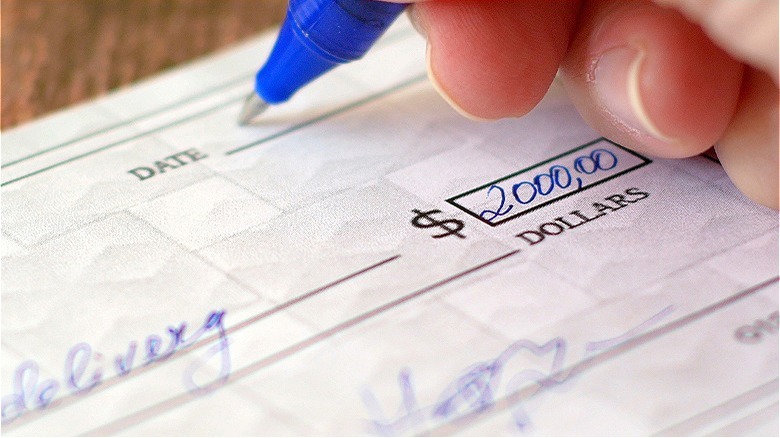What You Should Do If A Contractor Loses Your Payment
American homes are a collective of possessions that both create wealth and demand a considerable financial input. From monthly bills, including a mortgage payment that averages $2,390 per month, according to the 2023 Annual Cost of Living Index from the Council for Community and Economic Research (via Quicken Loans), to routine upkeep costs like mowing the lawn or painting the walls every few years, there's a lot that goes into homeownership.
Hiring a contractor to renovate your home is one of those expenses. Per Polaris Market Research, America's residential remodeling industry was valued at a market size of over $517 million in 2023, with an expected rise to $754.75 million by 2032. More importantly for the average homeowner, in 2022, 43% of payments to contractors (i.e., HVAC technicians, plumbers, electricians, and builders, etc) was made via check while credit cards accounted for 31% and debit cards 29%, according to the 2022 Survey and Diary of Consumer Payment Choice (via the Federal Reserve Bank of Atlanta).
Unlike digital transactions that record an exchange of capital in real time, written checks require a payee to take action — something they might not do immediately. It's even possible for a contractor to misplace your payment and then call asking for a replacement check. Should this happen, it can be a daunting conversation to have, but believe it or not there's a "best way" to handle this kind of ask.
Check: Reissue the check and cancel the old note
Considering that check writing is the most common format used to pay for contractors' services in the United States, it's likely you've relied on this method yourself. If a contractor has lost the check, there's really no harm done. The only problem you may run into here is if a considerable time has passed since you initially budgeted for the payment and hadn't noticed it wasn't debited from your account. In this case, you may need to work with the contractor to agree on a payment timeline to make them whole for their services. After all, if you no longer have the cash available to complete the transaction, a brand new check in hand is as useful as the lost draft.
Bottom line: If you haven't actually paid for the services, then you owe the contractor their money, and you should cut them a new check (it's something you'd hope for if you lost a check, after all!). However, as is the case with a budgeting conundrum, there are some strings attached. For one thing, you'll want to cancel the initial check. It's unlikely to happen, but a busy contractor might ultimately find the original and forget that you reissued the payment, depositing both the initial check and its replacement. As well, if you have to pay to cancel the first check, you might consider asking if the contractor will cover these costs (with you functionally writing a replacement less the cost to stop the previous payment).
Debit, credit, or bank transfer: Refer to your bank
It's not common, but there can be mix-ups in the banking system that connect your payment to the contractor who should be receiving it. It's possible that you may have forgotten to follow through on every step required to send the payment, or the bank may have actually lost track of the transaction along the way. No matter what the case may be, there's a digital trail of breadcrumbs that will help you identify exactly where the lines got crossed. If you have a confirmation that the money was sent, then there's an issue in either your bank or that of your contractor. Calling your bank to track down the transaction will help shore up any problems on your end.
Similarly, it's possible that the payment didn't go through for one reason or another. Perhaps your contractor provided incorrect account details or you weren't accurate enough when inputting your own card details or their account information. In this case, you'll either find a failed transaction in your banking records, or none at all. If this is the case, you'll need to work out a plan to make the payment as soon as possible. Once again, your contractor has performed a service they should be paid for, and if you haven't yet made good on your end (no matter how innocuous the reason may be), you will need to do so.
Cash: Consult your records (and certainly refuse)
In the extremely unlikely event you pay a contractor with cash and they come back suggesting that they've lost (or never received) payment, you may be dealing with a scam or something similar. Cash isn't something you should use to pay for a variety of expenses, including air travel, concert tickets, and oftentimes, contractors. If you do pay a contractor in cash, then you must get a written receipt of some kind. This might be in the form of a signed acknowledgement of payment or something a bit more official on headed paper. Regardless, a receipt will be your only confirmation that a payment has been made for the services you've been given.
A cash payment dispute is an I-said-they-said affair that can't be definitively cleared up in favor of either party. More benign, but still in the same realm, if your contractor says they've actually lost a cash payment, you should consider apologizing for their trouble, but refuse any sort of responsibility for the issue. Once payment has been made in cash, then the contractor becomes responsible for managing that money: It's theirs and no longer yours. This one's quite simple, but it can be a socially challenging situation to handle. Keep your wits about you and politely engage with the contractor while backing away from the misfortune they've experienced because it's really not your problem.



